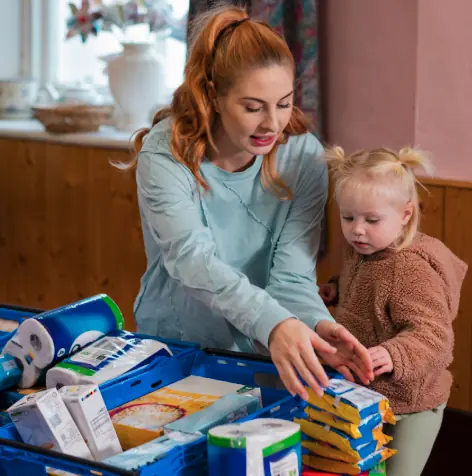How councils can ease the administrative burden of the Covid Winter Grant Scheme

As we enter another national lockdown councils are set to face yet more pressure to deliver help to businesses and households affected by the pandemic.
The challenges posed by COVID have seen local authorities forced to develop new processes to support households in need, requiring their attention to be diverted from other essential work. One example that continues to demand significant effort to get help where it is most needed is the administration of the £170 million COVID Winter Grant Scheme.
The scheme, introduced in December 2020, is designed to help children, families and the most vulnerable households meet food, energy, water and other essential costs during the winter period. It follows on from the Summer Food Fund and was established largely in response to Marcus Rashford’s campaign to ensure children eligible for free school meals can still get support in the school holidays during the pandemic. On 4 January, the Prime Minister announced a further extension to free school meal provision through the current lockdown period, the full details of which haven’t yet been published so the extent or breadth of support is not yet known.
In this post Henry Naish looks at who the COVID Winter Grant Scheme is intended to support, how councils can identify eligible families most in need of the support, and how central government can act quickly to make this happen.
Who the Covid Winter Grant Scheme is intended to support
According to DWP guidance the stated aim of the COVID-19 winter grant scheme is to “give vulnerable households peace of mind … over the winter months during the pandemic by helping those who need it to have food on the table and other essentials, so every child will be warm and well-fed this winter.”
The scheme is designed to help vulnerable households, in particular those with children, to meet their immediate needs over winter (from December 2020 to March 2021). Immediate needs are considered to include food, utilities, water and other related essentials.
While local authorities may take into account people who are in receipt of benefits they are encouraged to consider other circumstances too, meaning that households who are not receiving benefits can also be considered.
Awards can include grants to third parties, issuing vouchers to households, cash transfers, or the direct provision of food. Similarly, what constitutes a ‘vulnerable’ household is left open. Emphasis is placed on the judgement and discretion of the local authority to identify households who are most in need, as well as the collaboration with social workers, GPs, food banks, voluntary organisations and other third parties to make these assessments.
At the time of writing, further measures to help financially vulnerable households are not expected to be announced until the Budget on 3 March 2021.
How awards for the Covid Winter Grant Scheme should be made
Awards must satisfy the following framework:
- 80%+ of funding must go to households with children, with the remaining 20% to other households in or at risk of poverty
- 80%+ of funding must go towards food and utilities, with the remaining 20% towards other essential expenditure in line with the goals of the scheme, which may include items like cooking equipment, toiletries and sanitary products, and boiler servicing and repair
- Funding may not be used to support housing or rent payments, or to provide general financial or debt management advice
Beyond these parameters local authorities have been given the flexibility to identify households who might benefit most from support. Councils may either proactively identify households themselves, or ask people to apply for support. There are no formal requirements or means-tested elements in the scheme although councils can impose their own criteria and checks to determine who is most in need.
How councils can use data analysis to identify households in need
In addition to using their own non-DWP data local authorities can also use DWP’s Searchlight portal to access information on entitlement and receipt of DWP benefits to help make decisions on awards.
Although councils are encouraged to proactively identify households, the official guidance for the COVID Winter Grant Scheme limits the use of the Universal Credit data share, the method by which DWP shares data on Universal Credit recipients with councils.
The guidance states that local authorities are not permitted to use income data provided on Searchlight to help them to deliver the Test and Trace Support Payment Scheme. This is despite there being existing legislation allowing for councils to use this data to support the administration of local welfare schemes.
A coalition of councils has written to DWP asking why this is the case, and are awaiting a response. If you would like to learn more about this please email hello@policyinpractice.co.uk.
Despite these unhelpful limitations on what data can be used to support the administration of these grants, local authorities can still streamline their efforts to find families who would benefit most.
Leading councils use Policy in Practice’s LIFT platform to identify households for the COVID Winter Grant Scheme
Many local authorities already analyse their data to identify financial vulnerability, target support and track change using Policy in Practice’s LIFT platform, a tool that gives councils visibility over their low-income residents.
While DWP’s Universal Credit Local Council Tax Reduction data cannot be used to assess specific awards, LIFT can help councils to identify where the need for support exists, and what types of households meet the framework criteria. For example, LIFT’s filters allow councils to analyse and sort data to identify financially vulnerable households with children, households struggling to meet utilities and food costs, and households who may be facing an immediate cash shortfall over the winter period.

The LIFT platform lets councils drill down into their data to identify households eligible for Winter Grant Scheme using poverty indicators
In response to the COVID-19 emergency support schemes we have built a range of new indicators within LIFT to show:
- Food poverty: A household’s total minimum acceptable food expenditure (based on the Minimum income Standard) is higher than their income after priority costs
- Fuel poverty: A household’s income after fuel expenditure would bring their income below the relative poverty line
- Water poverty: A household’s estimated water costs account for 3% or more of their disposable income (income less housing, utilities, food and personal care costs)
Currently in beta development, we welcome feedback, particularly from frontline advisors, on how well these definitions are helpful in identifying vulnerable residents.
Supporting low-income families with home schooling costs
In his address announcing the latest lockdown the Prime Minister also said “We’ll distribute more devices to support remote education.” Whilst this is clearly good news, no mention was made of support to meet the hidden costs of connecting to the internet, be that by broadband or mobile data charges.
To help families with the running costs of home schooling Policy in Practice’s Better Off Calculator can identify where a household may be eligible for other support, including discounted energy or broadband bills, and signposts where to apply. The Better Off Calculator is used by frontline organisations to advise households of benefit entitlement and ways to maximise their income.

The Better Off Calculator automatically displays alerts when you may be eligible for reduced wifi or mobile phone tariff
Central government can do more to help local government deliver
As the delivery arm of government councils continue to play a vital role in protecting the most vulnerable people in our society from the worst impacts of the pandemic.
Councils need financial support from central government to administer much needed grants and other resources. Crucially, they also need to be trusted and enabled to get this support out effectively.
The guidance on the COVID Winter Grant scheme asks councils to ‘proactively identify households’ (paragraph 22) yet limits their ability to use the Universal Credit datashare for this purpose (paragraph 16).
In addition to the COVID Winter Grant Scheme, councils are being asked to administer a further extension to free school meal provision through the current lockdown period and, it is expected, will play a key role in administering the £4.6 billion relief package for retail and hospitality sectors.
Councils are under pressure to deliver and don’t have time to overcome the limitations set by the government to identify households that may need support. They need to be trusted and enabled to use data in a considered and intelligent way, in order to administer the billions of pounds of discretionary support as quickly, efficiently and cost-effectively as possible.



